https://www.youtube.com/watch?v=aH4f0aBDvXo
How to Make Unbelievably Crispy Latkes - Recipe & Technique (Hanukkah Potato Pancakes)
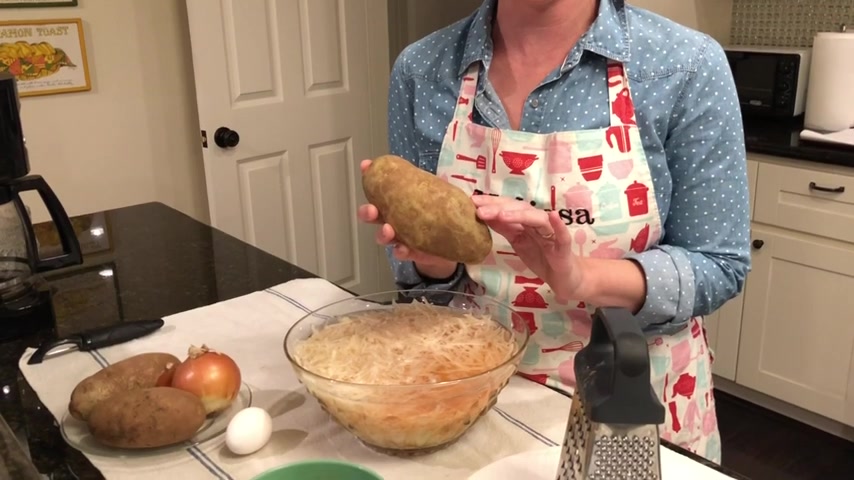
Hi , I'm Melissa from little Kosher lunch .
Thank you for joining us .
And as you can see today , we are making Latkes .
Hanukkah is very fast approaching .
Um Although I would say that these lakes are so good , crisp and delicious that you may make them at other times of year as well .
My typical ratio is three very large and long russet potatoes , one onion , one egg .
Um and then I fry in grape seed oil , but you can use another um clean flavorless oil and then I salt mine at the end .
The reason you use a rest of potato is you're gonna get a very consistent potato starch level that works well and gives a crisp black .
You want a really long big potato because my first rule of an excellent Latke is a long strand .
So I have peeled three russet potatoes already .
I have grated one onion already .
I'm gonna set these aside .
I have an egg here .
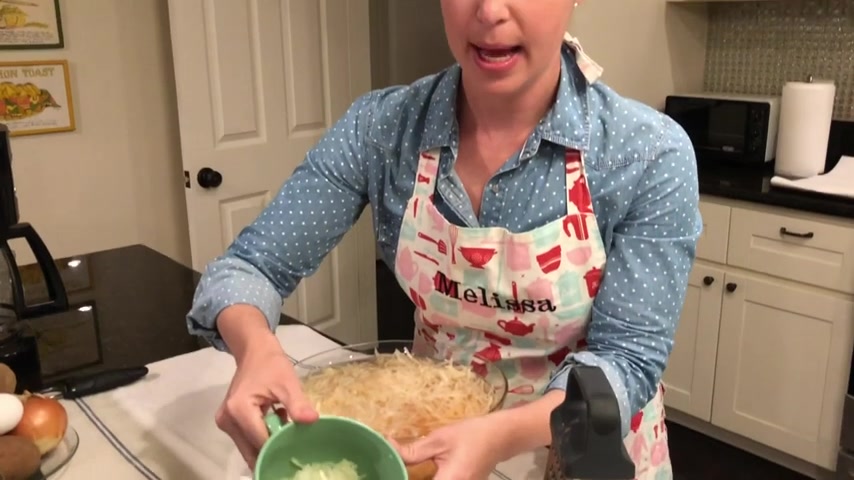
I have another egg at the ready just in case I feel like I need another egg .
My onion has already been grated .
This is one grated onion on an old fashioned box grater .
I've peeled my potatoes .
I've shredded two of them , but I have one that's hiding in this bowl of cold water and I'm gonna pull it out and I wanna share with you how I like to grade a potato for best results .
When you're forming your little Latke , this is gonna help your Latkes hold together .
Well , and it's a long shred technique .
So you're gonna go this way .
This is the reason I don't use a food processor , which usually cuts the potato the short way .
I'm gonna start grading .
I move my bowl over .
We're gonna stop there because I think I have enough potatoes ready for you .
So I grab my strands as you can see .
They're nice .
They're long , they're not a really short strand .
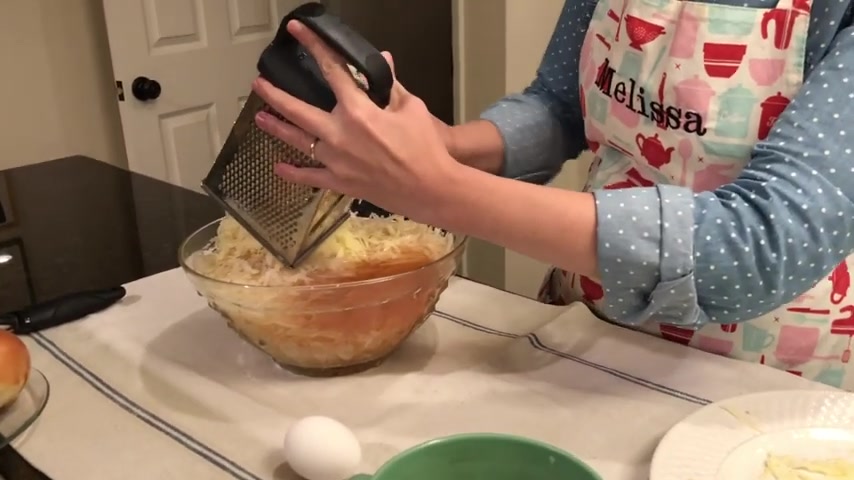
They're already kind of tangled amongst themselves .
They're really wet .
I'm gonna put them back in the cold water .
So this is at this point , just a bowl of cold water with three peeled and hand shredded potatoes done on the box grater .
So I just tickle them out of my box grater .
Put the rest in .
There's some discoloration as you see , but it doesn't bother me .
I'm gonna set this aside .
OK .
And the next step is um because I don't add any fillers to my Latke .
That's the next um tip for a perfect latke is add as little filler as possible .
Perfect Latke to me is a very pure , pure experience of a crispy , crispy , delicious potato with the flavoring of your onion and the saltiness and crunch when you add your salt that's on the outside .
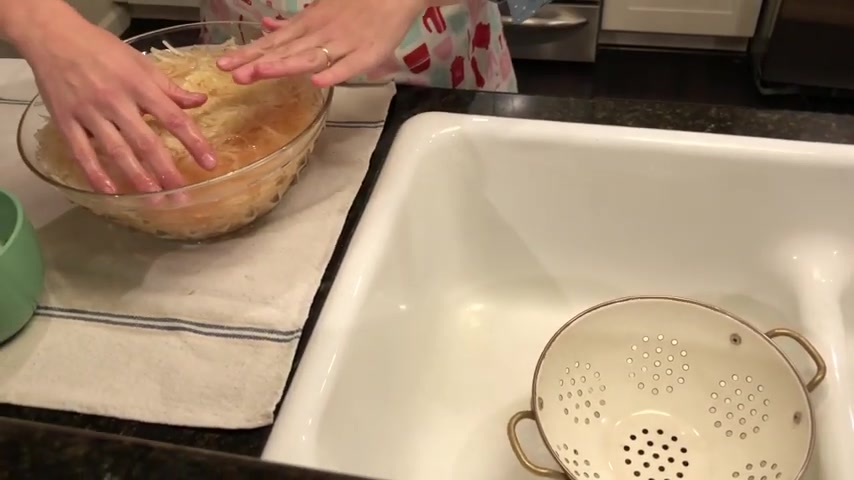
So , what I do now is we are going to remove the potato strands and I'm gonna leave in this bowl of water , the starch that's left behind and we're gonna let the starch settle as I'm carefully lifting out , squeezing the water , I'm letting the starch , you can see cloudiness .
I'm letting the starch return to the bowl and I'm just gonna put my strands off to the side in this colander .
They're gonna maybe drip and um dry out a little more .
OK ?
So I'm just squeezing it out with my , with my little fist and I'm gonna run my fingers through .
I already feel a little layer of starch forming at the bottom .
It'll probably take 3 to 5 minutes .
Maybe you can give it even longer for the starch to really settle and you'll see a layer of white at the bottom of your bowl .
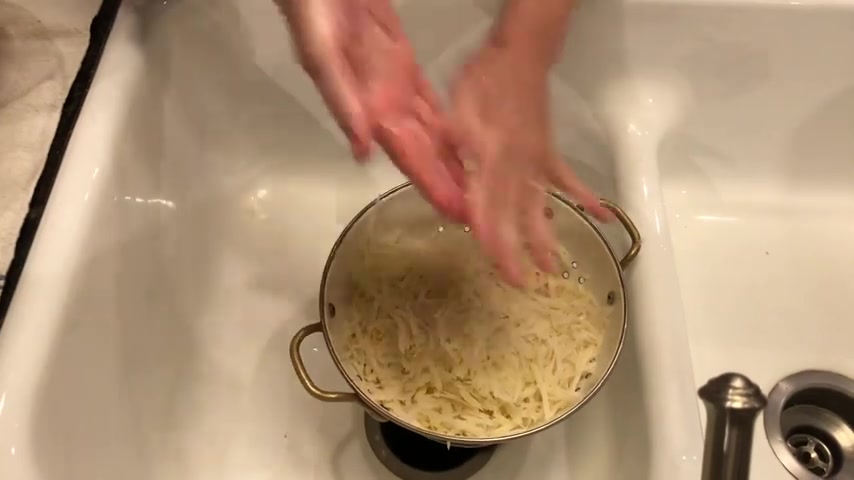
So I'm gonna just press , press a little bit in my calendar , dust off my hands .
I'm gonna let my oil come up to temperature , which is in a cast iron skillet .
It's gonna slowly keep the skillet .
Ok ?
It's still a little bit cloudy .
Um But because I want to get on with these , I think it's good enough that I can see about a quarter to a half an inch of the white starch that has formed at the bottom are you able to see that ?
All right .
So now I take my bowl over the sink and I'm gonna very gently and slowly pour out the water running over the edge .
Not too quickly but really slowly so that the starch at the bottom isn't disturbed .
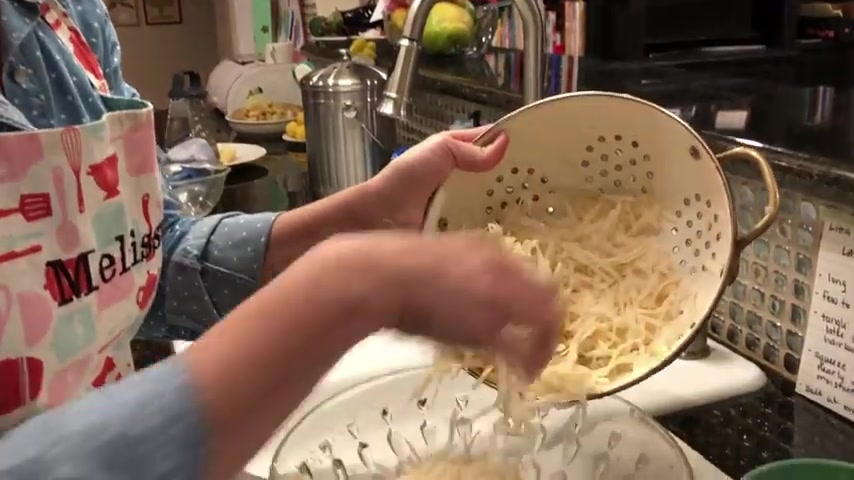
All right .
Put my potatoes back in .
Now , they're really nice and dry .
Even though our water turned pink , our potatoes are still white and nice looking .
This is pretty nice and dry .
Once I add my onion , it has some juice , I'm just gonna add the whole thing and we're going to squeeze these lakes again .
Ok .
So we have one shredded onion , three shredded long strand , shred potatoes , one egg .
And I'm just gonna mix them and incorporate the potato starch from the bottom .
The potato starch is that binder instead of flour , like many people add to their lakes .
So I'm gonna just use my final technique that I'm gonna show you today , uh , which is a tangle and squeeze technique to form my little lake .
And this is gonna remind you of a hair ball that you find in your drain in the shower .
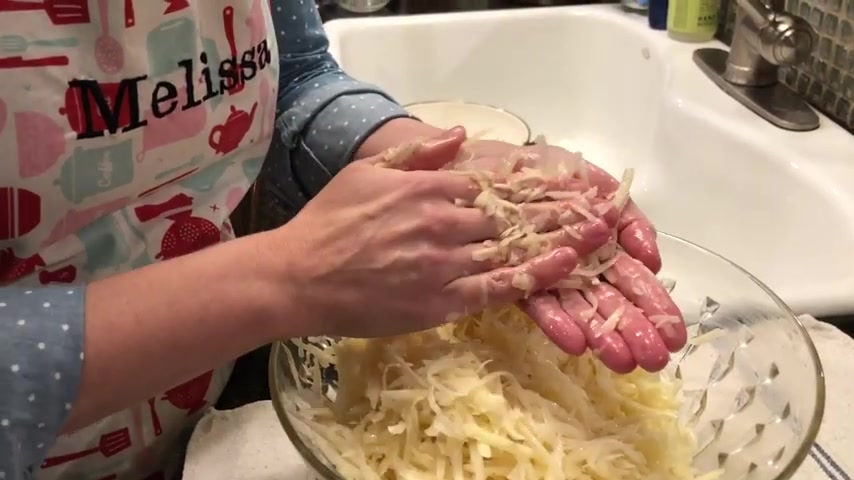
Um The reason we made these long strands is that they're gonna tangle really , really well , like a little tingle of hair .
And when I put them in the palm of my hand , which is the size of Latke that I like , you're then gonna tangle them so that they hold together really nicely press them to squeeze out additional moisture .
And this is your perfect Latke that you throw into your pan of shimmery hot oil .
You will need to add oil , um , over the course of making a full bowl of Latkes .
Um , so I keep my oil handy and I have a cookie sheet ready that's lined with paper towels to receive the cooked Latkes .
Ok .
All right .
So testing with a piece of potato , it looks great .
I'm gonna form a show you how it goes .
So we have this little guy we've tangled .
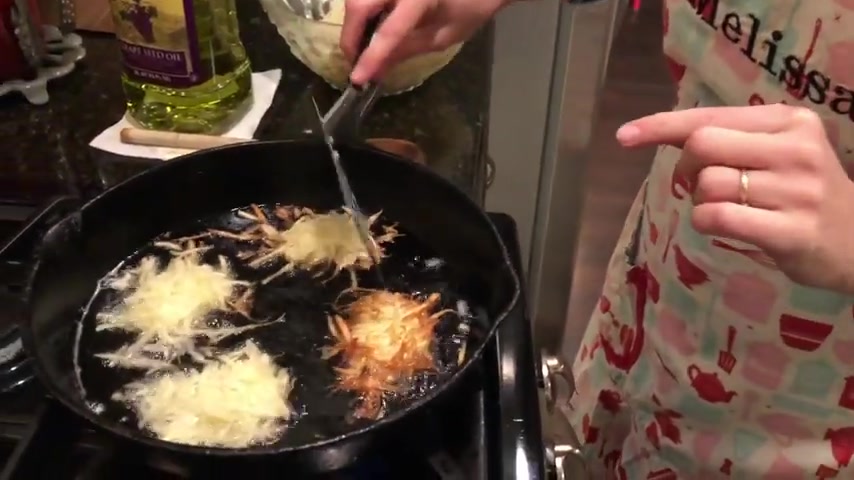
I pressed any additional liquid out just back in the bowl , no matter what , you know , just tangle it up , squeeze that extra bit of moisture out and call , this is pretty nice and golden .
It could go even a little bit further .
Another way that you can tell that your Latke has um given off a lot of its moisture and the potato is very cooked is when you see fewer bubbles happening .
So I kind of watch and I see vigorous bubbling here .
That means that the , there's a lot of moisture cooking out and sort of boiling out of your Latke and your potato .
And then as that settles down and is a little bit less enthusiastic bubbling .
Then you know that your Latke is getting more cooked and is really just turning golden .
You don't want it to go too far .
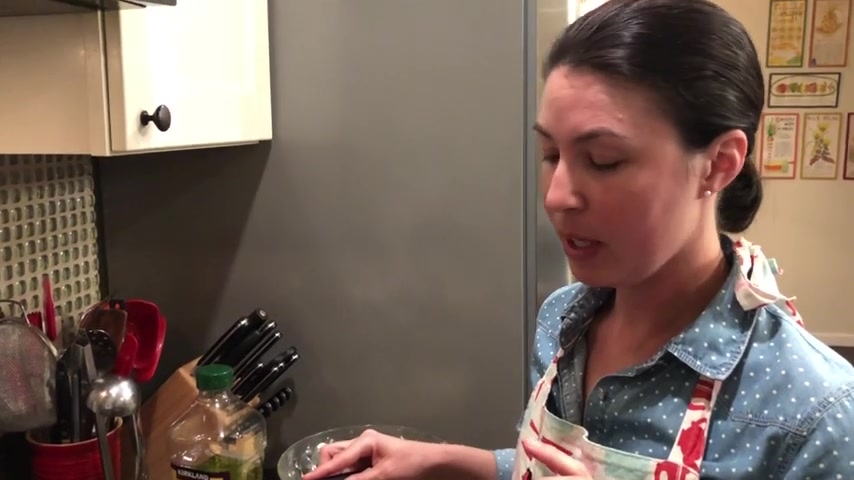
So this one is quieted down .
These are getting ready to be turned still lots of , lots of liquid in those potatoes to cook again .
I said these refrigerate .
Really ?
Well , you can also just leave them out if you're doing them late night or early morning before an event .
And , um , you can freeze them if you're doing them even further in advance and then warm them in a 200 to 250 degree oven .
I'm gonna flip and then I'm gonna take some of these out and let them cool on a towel .
You can look at them better after they've drained and cooled .
Ok .
So now our lakes are here and they're gonna be draining .
I like to give them a little hit of salt while they're cooling and having the , um , oil absorbed by the paper towel here .
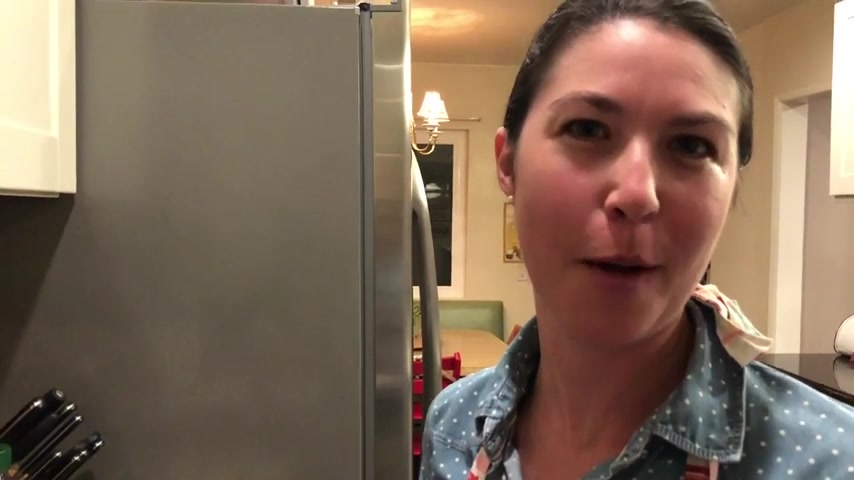
They need to cool a little bit and look how golden they are .
These are the most fantastic crispy Latkes .
They are creamy in the center crisp and shaggy on the outsides .
Lakes are very *** food for Hanukkah .
They're also a very egotistical and important food for a mother to make for her family or whoever is cooking in your family .
These are the lakes that everyone is going to talk about at the party .
I'm Melissa from little kosher lunch .
Thank you so much for your time and you're learning with me today and Happy Hanukkah .
Are you looking for a way to reach a wider audience and get more views on your videos?
Our innovative video to text transcribing service can help you do just that.
We provide accurate transcriptions of your videos along with visual content that will help you attract new viewers and keep them engaged. Plus, our data analytics and ad campaign tools can help you monetize your content and maximize your revenue.
Let's partner up and take your video content to the next level!
Contact us today to learn more.